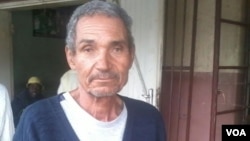There are some things that the majority black Zimbabweans had never seen before but the worsening of the country’s economic crisis has forced them to get accustomed to seeing members of the white community in particular and other minorities, begging on the streets of Harare or doing menial hospitals and even seeking treatment in public hospitals.
It’s not surprising these days to see white or coloured beggars on the streets of Harare and other cities across the country.
An informal survey by Studio 7 revealed that some of these new beggars used to stay in the city’s affluent suburbs and have been forced to move to high density residential areas, usually reserved for the urban poor working class. They also now use public hospitals to seek medical attention.
They frequent run-down pubs in the sprawling high density areas, places you would have never dreamt to meet a white Zimbabwean, say 10 years ago before the Zanu PF government confiscated commercial farms and parceled land out to blacks.
Non black communities, a number of those interviewed told Studio 7, said had for a long time been shielded by their classes and spared the economic hardships faced by the majority of the people in Zimbabwe.
One such person is Kenny Roan, who used to work as a grader operator for the Masvingo City Council.
Roan, who is a colored and stays in Mucheke high density suburb, said it is wrong to believe that only blacks are affected by the prevailing harsh economic conditions.
He adds that though most of his kith and kin stay in more affluent suburbs, they are also suffering just like him and the majority poor Zimbabweans.
Roan said the situation is so bad that even some assistance from well-wishers is not enough to sustain him and his family.
He appealed to donors and well-wishers not to exclude non-blacks whenever they give out food handouts and clothes, saying non-white communities are equally affected by the economic crisis in the country.
The government and non-governmental organizations, he said, normally do not provide social assistance programs for non-black communities because they are generally considered to be well off people who can sustain themselves.
Roan said this is a wrong assumption as they are also facing serious problems due to the current socio-economic and political situation in the country.
A white man, who moves around selling samosas and pies in Masvingo, wonders why people are surprised to see him on the streets selling his wares
He said his plight is not different from any other ordinary black Zimbabweans.
The man, who refused to be named, said he lost his job some years back and selling different wares on the streets was the only option he had to keep his family fed.
He said his little business was doing well, adding that he had used some of his profits to a buy a small car, which he sometimes uses as a pirate taxi when he is not on the streets selling pies and samosas.
There are some people who want to assist these destitute Zimbabwean citizens.
John Kirsten from Runde said he’s willing to help those in the non-black communities who are struggling so they can pick-up their lives and return to their former good old days.
He adds that he will not only assist his own kith and kin but every Zimbabwean who’s in need if he can. Kirsten added that he believes the government’s economic blueprint, ZimAsset, can help the economy recover if implemented well.
Some former white commercial farmers, who lost their farms during the fast track land reform program that started in 2000, have moved into towns and cities where many are evidently struggling to make ends meet.
But do not be fooled to think Zimbabwe no longer has an affluent white community. A visit to some affluent urban areas like Borrowdale, Sam Levy’s Village and others do prove otherwise.




